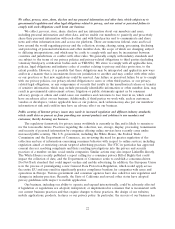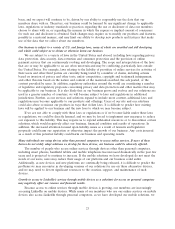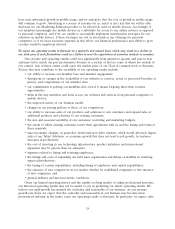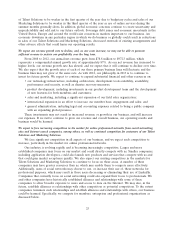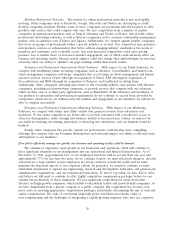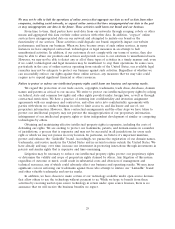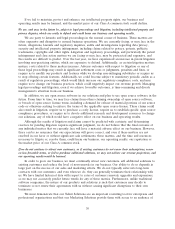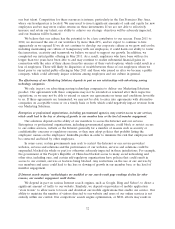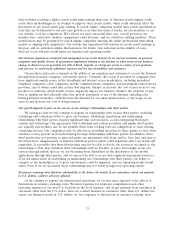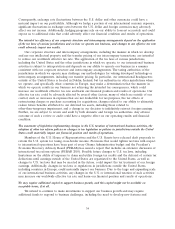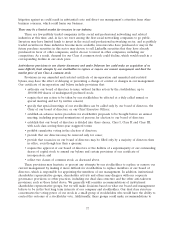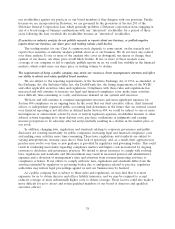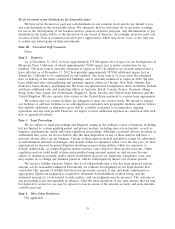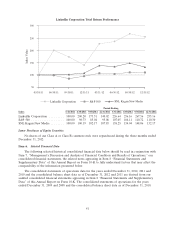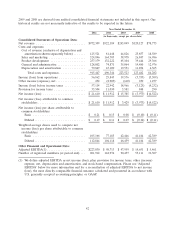LinkedIn 2012 Annual Report Download - page 34
Download and view the complete annual report
Please find page 34 of the 2012 LinkedIn annual report below. You can navigate through the pages in the report by either clicking on the pages listed below, or by using the keyword search tool below to find specific information within the annual report.our best talent. Competition for these resources is intense, particularly in the San Francisco Bay Area,
where our headquarters is located. We may need to invest significant amounts of cash and equity for new
employees and we may never realize returns on these investments. If we are not able to effectively
increase and retain our talent, our ability to achieve our strategic objectives will be adversely impacted,
and our business will be harmed.
We believe that our culture has the potential to be a key contributor to our success. From 2011 to
2012, we increased the size of our workforce by more than 60%, and we expect to continue to hire
aggressively as we expand. If we do not continue to develop our corporate culture as we grow and evolve,
including maintaining our culture of transparency with our employees, it could harm our ability to foster
the innovation, creativity and teamwork we believe we need to support our growth. In addition, we
completed our initial public offering in May 2011. As a result, employees who have been with us for
longer than two years have been able to and may continue to realize substantial financial gains in
connection with the sales of their shares from the exercise of their vested options, which could result in a
loss of employees. There will likely be disparities of wealth between those of our employees whom we
hired prior to our initial public offering in May 2011 and those who joined us after we became a public
company, which could adversely impact relations among employees and our culture in general.
The effectiveness of our Marketing Solutions depends in part on our relationships with advertising serving
technology companies.
We rely, in part, on advertising serving technology companies to deliver our Marketing Solutions
product. Our agreements with these companies may not be extended or renewed after their respective
expirations, or we may not be able to extend or renew our agreements on terms and conditions favorable
to us. If these agreements are terminated, we may not be able to enter into agreements with alternative
companies on acceptable terms or on a timely basis or both, which could negatively impact revenue from
our Marketing Solutions.
Enterprises or professional organizations, including governmental agencies, may restrict access to our services,
which could lead to the loss or slowing of growth in our member base or the level of member engagement.
Our solutions depend on the ability of our members to access the Internet and our services.
Enterprises or professional organizations, including governmental agencies, could block or restrict access
to our online services, website or the Internet generally for a number of reasons such as security or
confidentiality concerns or regulatory reasons, or they may adopt policies that prohibit listing the
employers’ names on the employees’ LinkedIn profiles in order to minimize the risk that employees will
be contacted and hired by other employers.
In some cases, certain governments may seek to restrict the Internet or our service providers’
websites, services and solutions and the performance of our websites, services and solutions could be
suspended, blocked (in whole or part) or otherwise adversely impacted in these jurisdictions. For example,
the government of the People’s Republic of China has blocked access to many social networking and
other sites, including ours, and certain self-regulatory organizations have policies that could result in
access to our content, services or features being blocked. Any restrictions on the use of our services by
our members and users could lead to the loss or slowing of growth in our member base or the level of
member engagement.
If Internet search engines’ methodologies are modified or our search result page rankings decline for other
reasons, our member engagement could decline.
We depend in part on various Internet search engines, such as Google, Bing and Yahoo!, to direct a
significant amount of traffic to our website. Similarly, we depend on providers of mobile application
‘‘store fronts’’ to allow users to locate and download our mobile applications that enable our service. Our
ability to maintain the number of visitors directed to our website and users of our online services is not
entirely within our control. Our competitors’ search engine optimization, or SEO, efforts may result in
32


